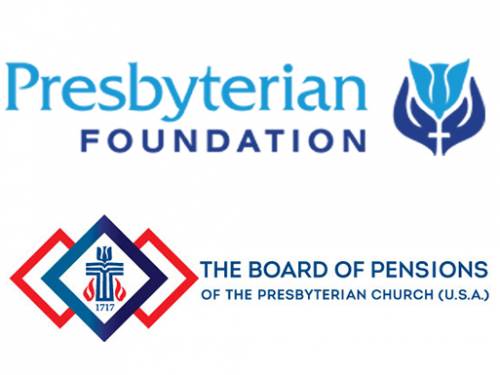Presbyterian Foundation and the Board of Pensions collaborate to create new research position
by Erin Dunagin | Special to Presbyterian News Service
 LOUISVILLE — If investors demanded it, would companies change their practices to benefit the environment and slow the effects of global warming?
LOUISVILLE — If investors demanded it, would companies change their practices to benefit the environment and slow the effects of global warming?
The Presbyterian Church (U.S.A.) Office of Faith-Based Investing and Corporate Engagement believes that this strategy can work, and that companies encouraged to do so may improve their practices through dialogue. The Presbyterian Board of Pensions and the Presbyterian Foundation are helping bolster this effort by paying for an additional staff person in this office. The staff person, Katie Carter, started work in 2017.
The Office of Faith-Based Investing and Corporate Engagement reports to Mission Responsibility Through Investment, a 12-member General Assembly Committee. Rob Fohr serves as director of the Office of Faith-Based Investing and Corporate Engagement and is the primary liaison between the staff and MRTI.
Corporate engagement process
How does one inspire change? How can an organization use its resources to bring about change? These are the questions that are at the forefront of the Faith-Based Investing office’s work.
“The highest concentration of our work is focused on engagements with suppliers of fossil fuel, oil and gas, and with large consumers of those, such as utilities and auto manufacturers,” Fohr said. His office, in conjunction with the Foundation, works with other faith-based ecumenical partners, as well as large state pension funds and other wealth management funds that have a similar focus.
In community with those investors, and on behalf of the PC(USA), Fohr and his colleagues engage with large companies that are producing or using large amounts of fossil fuels to try to get them to improve policies and improve governance in ways designed to help the environment.
Their progress speaks for itself. During the past two years, MRTI has:
- engaged in dialogues with 59 companies;
- filed or co-filed shareholder resolutions with 18 companies;
- established Guideline Metrics to measure progress with companies;
- increased the allocation of committee and staff time to addressing environmental and climate change with corporations.
“Mostly we are focusing on asking companies to incorporate environmental goals into their business plan, including goals such as the Paris Agreement,” Fohr said. “We are trying to focus on getting companies to incorporate climate risk into their long-term scenario planning which of course has implications for their capital allocation, how they think about their long-term assets, and if those assets will have value in the future. “
A willingness to dialogue
Fohr’s been really pleased with the conversations, and hopeful as the companies continue to dialogue.
“Companies in the oil and gas sector have been really willing to dialogue with us,” said Fohr.“They appreciate us, the amount of investment that we represent — but also that we are long-term investors,” said Fohr. “We are not looking just at quarterly profits, but at the long term.”
As a long-term investor, the Foundation needs companies to be profitable for the long haul. Fohr and his colleagues from MRTI let these companies know that they are “not just here to harass you” but really to help company leaders think strategically about the future.
The work takes time
It is a long game, Fohr said. The changes are incremental. But, over time, it can add up to enormous change. And that’s why the Foundation and the Board of Pensions have agreed to increase the resources focused on MRTI by creating a new position. Fohr was thrilled to have the additional assistance.
“What we really needed most was someone to be on top of the issues and research, to manage the information,” he said. “So much of this work is getting the right information to the right person at the right time.” That’s largely the job of Katie Carter, the new Research Policy and Information associate.
“There is a ton of background on the corporate side and also on the church policy side,” Fohr said. “We need this information in our toolkit.”
Corporate engagement is work that Fohr finds very exciting. “Why do we do this? We do this because of our reformed theology,” he said. “We have a lot of capital through our congregations, endowments, universities and members of congregations. What if we could infuse that capital with our Presbyterian values?”
The potential, as Fohr sees it, is great.
“If you are a faith-based organization, do you think you have a higher calling to advance some mission or goal through your capital?” Fohr asks. “If the answer is yes, then we want to help you with that.”
—–
Want to know more about the Office of Faith-Based Investing and Corporate Engagement? You can find them online here. Find the 2018 General Assembly Divestment/Proscription List here, and 2017 Shareholder Resolutions Directory with Proxy Voting Recommendations here.
![]() You may freely reuse and distribute this article in its entirety for non-commercial purposes in any medium. Please include author attribution, photography credits, and a link to the original article. This work is licensed under a Creative Commons Attribution-NonCommercial-NoDeratives 4.0 International License.
You may freely reuse and distribute this article in its entirety for non-commercial purposes in any medium. Please include author attribution, photography credits, and a link to the original article. This work is licensed under a Creative Commons Attribution-NonCommercial-NoDeratives 4.0 International License.